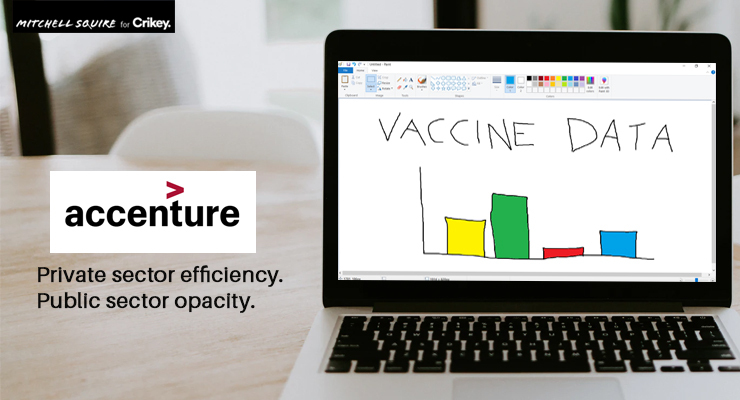
The Morrison government is scrambling to talk up how many injections were delivered this week as the states begin to open mass vaccination centres. But there is little detail about which Australians are getting which vaccines each day, or what age groups, and other vital information that would help paint a picture of the program’s success, even in its early phase.
“If [Accenture] were paid $8 million, then where is their data?” Professor Peter Collignon at the Australian National University’s medical school said. “Knowing what’s happening with this vaccine is very important. The data is there. The more that is available the better.”
What’s going on?
In December, Health Minister Greg Hunt appointed Accenture as the lead data partner in tracking the vaccine, and promised granular data on every dose, including temperature monitoring throughout the process.
Currently the government’s efforts to inform the public about the progress of the vaccine are limited to an infographic uploaded to the Health Department’s website sporadically — sometimes weekly, sometimes daily.

It’s a far cry from the real-time tracking system Hunt had promised. So has Accenture failed to deliver or is the data just not being shared with the public?
Accenture is one of the government’s preferred consultancy firms, raking in hundreds of millions of dollars every year in contracts. In February it won a $114 million contract with the Defence Department to help transform the government’s vetting systems over four years. Former defence minister Christopher Pyne cut the ribbon on an Accenture innovation hub for defence and national security in 2018.
But it’s the latest contract that health experts say warrants more scrutiny as the government tries to “reset” its troubled vaccine rollout.
Accenture declined to comment and the Health Department did not respond directly to Crikey’s questions but in a statement said the government had “full oversight of vaccines in Australia”.
“The department continues to work with and seek expertise from the private sector to inform the rollout, with aspects including program delivery, logistics, administration of vaccines and data support,” it said.
Collignon says the most critical information needed was a breakdown of AstraZeneca and Pfizer doses and the age of vaccine recipients.
“There’s a lot of information that should be coming out on at least a weekly basis,” he said. “We need to know how much [of the Pfizer vaccine] is coming in, and how much is approved on a week-by-week basis.”
Vaccine honeypot
The Accenture deal is more evidence of the government trying to solve problems by throwing money at consultancy firms that have fed off the taxpayer throughout the pandemic.
As Crikey revealed on Friday, the government has paid McKinsey $25,000 a day to investigate the business case for manufacturing an mRNA vaccine onshore, long after experts called for it. There’s been little detail about what McKinsey’s $2.2 million business case entails, or whether the government has taken its advice.
Stephen Duckett from the Grattan Institute says there was no reason why McKinsey should be the only company looking into the business case for onshore mRNA manufacturing.
“It’s not a unique skill set McKinsey has so they should not have been the only ones looking into it,” he said.
But he says the bigger problem was timing: “Why didn’t they do it six months ago? We are late in the game and at the end of the queue.”
Australia is producing only the AstraZeneca vaccine locally, and experts have slammed the government for not investing in local manufacture of mRNA vaccines.








such a great system-
-take expertise out of the public sector screaming that it’s inefficient and public servants are bludging bureacrats
-pay millions to big consultancies for reports that do nothing about anything with no accountability for how long it took anyone to write the report (I wish I got paid $1500.00 per hour)
-get a job with said consultancies when you retire from politics on your tax payer funded pension
It used to be called fraud.
By rights, it still is.
“None dare call it treason.”
Yes a single mom is labelled “jobseeker”versus bloke who posted profits is labeled “job keeper”…and we wonder why women are abused by simple folk.. every age and sector pitted against each other in a race to the bottom whilst these so called representatives are doing anything but work for the good of the democracy.
It’s been a ploy to stop any unionising as well as privatising for their cronies
Something decidedly fishy here; isn’t there also a $57m handout to PWC for some sort of vaccine rollout process?
Just the usual run of the mill corruption.
“Just the usual run of the mill corruption.”
But the rewards get bigger and better by the day.
Patience, ye of little faith! Just wait until you see the PowerPoint presentation!
Why . . . since last Federal Election, do Australians still expect “anything” of the Morrison Government? Other than denial of accountability and deletion of transparency?
LNP leadership no more than an anachronism for incompetence whilst all around the Public Service founders in favour of commercial friendships and future ‘safe havens’ securing retirement.
Isn’t ‘deletion of transparency’ called obfuscation; Morrison and his cronies call it marketing, and the rest of us call it spin.
We need senate estimates after every deal the government does with private entities
The senate estimates can only get to some of the information after the Prime Minimal has humiliated and bullied a woman to despair.
Then the payback happens.
The data is not there because there is nothing to report.
No vaccines equals no data equals a big fee for doing nothing much with great to do.
The main objective of this contract is to cover the Prime Minimal’s bum because currently it has a target on it!